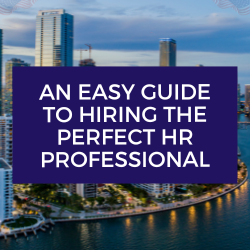Best Practices for HR Managers in 2025
April 16th 2025 | Posted by Jo Thompson
In 2025, HR is more than a support function; it’s a strategic engine driving business performance, culture, and resilience. Now involved with evolving employee expectations, rapid technological advancement, and shifting workplace norms, the most successful HR managers are rethinking how they lead people strategy.
We will examine how the best HR professionals are adopting agile, forward-thinking practices that address today’s workforce realities while building a foundation for long-term success. We will also examine the best practices they are using in more detail.
Adopting a people-first, tech-supported approach
Technology is revolutionizing the HR landscape, from AI-driven recruiting to automated workflows and predictive analytics. But in 2025, the most effective HR managers understand that while technology enhances efficiency, people remain the heart of every organization. Best-in-class HR teams balance digital tools with human empathy. They use tech to streamline processes while making space for meaningful connection, coaching, and culture-building.
Designing for flexibility
Flexible work is now an expectation, not a benefit. But it’s about more than remote or hybrid options; it’s about giving employees autonomy over how and when they work. Top HR managers recognize this and redesign policies and job structures, focusing on results, not logged hours.
Prioritizing mental health and holistic well-being
Workplace stress, burnout, and mental health challenges continue to rise. The best HR leaders treat well-being as a core pillar of organizational success. This includes mental, physical, emotional, and even financial wellness.
Championing inclusion, belonging, and equity
Diversity initiatives only go so far if they are not paired with real inclusion and equity. In 2025, employees expect to work in environments where all voices are heard and valued. Modern HR leaders know they must move beyond compliance and foster cultures of belonging.
Building a culture of continuous feedback and growth
Annual reviews are outdated. The modern workforce values frequent, real-time feedback and clear development paths. The best HR managers embrace the need to cultivate a culture of continuous learning, where feedback is ongoing and growth opportunities are visible and accessible.
Reimagining talent strategy around skills, not just roles
The future of work is skills-based. Organizations are shifting away from rigid job titles and toward more fluid models where employees grow across roles. This change in focus means that modern HR professionals are identifying skill gaps, upskilling employees, and making internal mobility a priority.
In summary
In 2025, HR managers are no longer just managing people. Their role has expanded and evolved significantly. They are shaping the future of work. HR leaders are prioritizing flexibility, inclusion, well-being, and continuous growth while embracing the right technology. Doing this allows them to build resilient, people-powered organizations ready for whatever comes next.
The most successful HR professionals are those who lead with both strategy and empathy. These managers recognize that the employee experience is at the core of every high-performing company, and that building a good experience makes it more likely that employees will be loyal to the organization.






